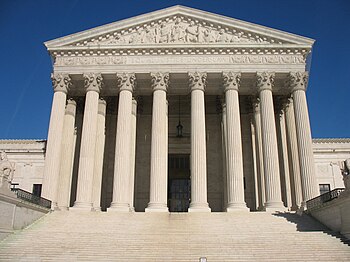
On May 22, the US Supreme Court ruled unanimously — and correctly — on a fairly obscure case that nonetheless has huge implications in an area where millions or even billions of dollars are frequently at stake. In TC Heartland v. Kraft Foods Group Brands, the Court came down against the practice of “forum shopping” in patent disputes. Hopefully this will reduce the incidence of “patent trolling.”
“Forum shopping” is the practice of filing suit in the court where you think you’re most likely to get the result you want. It’s a neat trick if you can get away with it, but in the normal course of things suits must be filed in the jurisdiction where the defendant resides.
Patent trolls exploited a loophole under which they could pick any jurisdiction to sue in so long as they claimed an infringement occurred there. Federal courts in Texas and Delaware became the patent litigation capitals of the US due to their troll-friendly reputations. The Supreme Court ruling restores the requirement that you must sue people where they live, not wherever’s most convenient.
So, what is “patent trolling?”
Article I, Section 8 of the US Constitution empowers Congress to “promote the Progress of Science and useful Arts, by securing for limited Times to Authors and Inventors the exclusive Right to their respective Writings and Discoveries.” For better or for worse (opponents of “intellectual property” as such say worse), copyright, trademark, and patent are longstanding features of US law pursuant to that power.
Here’s the way patents are supposed to work: You invent something. You register your invention with the US Patent & Trademark Office, and for 20 years after that only you, or people who receive permission from you, may manufacture that invention (if it’s a physical thing), use that invention (if it’s a process), etc.
Here’s the way patent trolling works: The troll procures ownership of a patent by filing it directly with USPTO or purchasing it from its original filer. Then the troll goes around accusing companies of infringing that patent and demanding “licensing fees” or other payoffs on threat of being sued. The troll neither produces, nor pretends to want to produce, anything useful. He’s just running a scam.
Often the victim will pay up on the reasonable supposition that doing so is cheaper than going to court. And of course each victim who does pay up makes the patent troll’s potential legal case against other victims a little more plausible.
Patent trolling works best with very vague, broad specifications. The Electronic Frontier Foundation’s “Stupid Patent of the Month” award recipients include, recently, a patent on dispatching taxi cabs, a patent on storing files in folders, and a patent on carrying trays on carts.
Obviously a little more common sense on the part of the Patent & Trademark Office would go a long way toward ridding us of patent trolls.
Failing that, the Supreme Court’s ban on “forum shopping” will at least make it harder for patent trolls to cash in. That’s a good thing.
Thomas L. Knapp (Twitter: @thomaslknapp) is director and senior news analyst at the William Lloyd Garrison Center for Libertarian Advocacy Journalism (thegarrisoncenter.org). He lives and works in north central Florida.
PUBLICATION HISTORY
- “Court loss by patent trolls is a win for honest commerce” by Thomas L. Knapp, Dublin, California East Bay Times, 05/23/17
- “SCOTUS: Patent Trolls’ Loss is a Win for Honest Commerce,” by Thomas L. Knapp, Ventura County, California Citizens Journal, 05/23/17
- “SCOTUS: Patent Trolls’ Loss is a Win for Honest Commerce,” by Thomas L. Knapp, OpEdNews, 05/24/17
- “SCOTUS: Patent Trolls’ Loss is a Win for Honest Commerce,” by Thomas L. Knapp, Newberry, South Carolina Observer, 05/24/17
- “SCOTUS: Patent Trolls’ Loss is a Win for Honest Commerce,” by Thomas L. Knapp, Pickens, South Carolina Sentinel, 05/29/17
- “Patent ruling a win for honest commerce,” by Thomas L. Knapp, Pasco/Pinellas [Florida] Suncoast News, 06/06/17

